Stephanie Balzer (SB) is a writer, coach, and founder of Mission. She recently wrote the Why is Sedona Interesting? edition, among others.
Stephanie here. Noah sent me a copy of Marshall McLuhan’s The Medium is the Massage, published in 1967 because I’d never read it. (How is it possible I hadn't read it? Who knows. Moving on.)
For others who are uninitiated, McLuhan was part philosopher, part futurist who predicted the internet, part poet-slash-artist who wrote at the intersection of media, technology, and humanity with a great deal of curiosity and concern. He became a pop icon with a cameo in Annie Hall, was featured in magazines like Harper’s and Vogue, cited everywhere, referenced on The Sopranos and in Peter Gabriel lyrics, etc. It’s been widely reported that he was religious. Perhaps it’s more accurate to say he was deeply spiritual, a seeker who anchored his longing for beauty and truth in the orthodoxy of organized religion, which did not necessarily mean the same thing in 1937, the year he converted to Catholicism at age 26, as it does today.
McLuhan’s style seemed matter-of-fact and his temperament, pragmatic. In short, he probably would have squashed a wayward spider with a tissue and flushed it down the toilet rather than gingerly relocating it to the backyard.
But that’s not to say he was unemotional. He wrote with the urgency of the atomic age. His sentences read like the incessant ringing of a rotary phone that possibly no one will answer, his themes develop in bold graphics and with black-and-white images that emerged from the chemical baths of their darkrooms.
Why is this interesting?
All of this surfaced, several weeks ago, when Noah wrote about McLuhan’s relevance to today’s public discourse on artificial intelligence. And as I dove into my gifted book, I realized I had absorbed more of McLuhan’s influence and ideas than I’d originally assumed: I just hadn’t become a superfan yet. That may describe you, too.
Know that those superfans exist. In some tech circles, McLuhan is thought of as a prophet, a diviner of technology due to his ability to predict trends (he was named the patron saint of Wired in 1992). Consider this passage, which opens The Medium is the Massage:
The medium, or process, of our time—electronic technology—is reshaping and restructuring patterns of social interdependence and every aspect of our personal life. It is forcing us to reconsider and re-evaluate practically every thought, every action, and every institution formerly taken for granted. Everything is changing—you, your family, your neighborhood, your education, your job, your government, your relation to “the others.” And they’re changing dramatically.
Imagine his university late one night. Buildings are empty and locked, library books are put away on shelves, mice snuggled up and asleep in their laboratory cages. There’s McLuhan in his office, smoking a cigarette and thinking, “Everything is changing and by force. Every aspect of our lives. Dramatically.”
It is the language of the crusader and dissident alike, the way rhetoric from strongly opposing sides of an argument sometimes meets at the seams.
Once, years ago, I stepped into an elevator in a bank building in downtown Phoenix. An old man, already in the elevator, with wild white hair and sandals, looked at me and said, “I can tell by the shape of your eyebrows that one day you will work in a field that hasn’t been invented yet.” I rarely think about that encounter, but it isn’t one you easily forget, either. It reminds me of the time a psychic at a street fair told me I had “owl eyes”—I desperately wanted that to be true, to believe this woman could know my essence.
In that moment in the elevator, an entirely new sense of self whooshed through me and I envisioned a future I’d never dreamed of before. How is it that wanting to be in technology is like no other wanting?
Then the elevator dinged. Its doors opened. I stepped out.
Thanks for reading,
Noah (NRB) & Colin (CJN) & Stephane (SB)
—
Why is this interesting? is a daily email from Noah Brier & Colin Nagy (and friends!) about interesting things. If you’ve enjoyed this edition, please consider forwarding it to a friend. If you’re reading it for the first time, consider subscribing.






